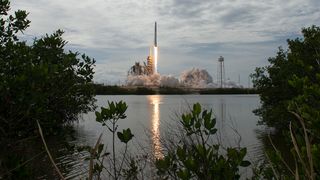Just over two months ago, American aerospace manufacturer SpaceX successfully launched a satellite into Low Earth Orbit, not only re-using a second-hand rocket, but landing the first stage boosters back to Earth. A few weeks later, using the same class of Falcon 9 rockets, SpaceX delivered another satellite to Geostationary Transfer Orbit. And just last week, SpaceX landed yet another Falcon 9 on a resupply mission to the International Space Station, using a refurbished capsule.
In the same week, neighbouring New Zealand startup Rocket Labs launched a rocket mostly made of 3D printed parts and designed to deliver micro-payloads. Their launch price is advertised at just US$5M.
With certification by the US Air Force for classified payloads, the aggressively low launch prices from SpaceX are leading to the amalgamation of civilian government, military and commercial customers on a consolidated platform. The Falcon 9 has launched research, communications and surveillance satellites alike, and later this year, Musk will extend the platform capabilities yet again, launching the X-37B spaceplane.
The traditional trio dominating the launch industry – Arianespace, International Launch Services, and the United Launch Alliance – have all begun to feel the strain in the light of new competition. But just how much of these cost savings are coming from technology benefits alone? Not all is rosy at SpaceX, which, already known to pay their employees well below their Silicon Valley counterparts – suffered a class action from employees last month.
A leak from the Wall Street Journal of SpaceX’s finances showed that Elon Musk made large bets for revenue on providing satellite internet services worldwide in the coming decade – a service market easily ten times larger than the launch services market. Like many of Musk’s ventures, it has not been without criticism – but without a doubt, Musk has already shown critics his ability to break barriers thought impossible.
The countless vicissitudes within the IT and electronics industries which transformed the world will always be in the mind of the space community. Whilst the industry continues to mature, with a plan for rocket launch taxation in California, other policy frameworks remain stagnant. Addressing NASA’s latest cohort of astronauts last week, US Vice President Mike Pence’s announcement to relaunch the National Space Council remained vague more than three months after the NASA Transition Authorization Act was passed.
The US is far ahead of its competitors for new launch capabilities, but competition in coming decades is inevitable and already on the horizon. And by current regulations, the US is unlikely to ever launch military satellites for all but their closest allies. With dual-use proliferation of satellites, is this a national security interest? Or just lost revenue?
The future of human and machine endeavours in space remain uncertain, but the private citizen and taxpayer alike will all benefit from some much-needed competition.





